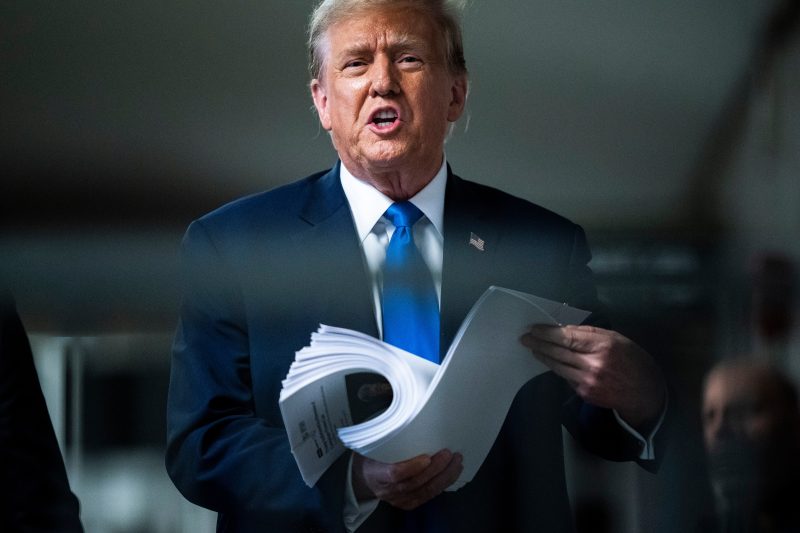
In the trial, like the election, Trump’s base is inoculated against loss
As New York Supreme Court Justice Juan Merchan was providing jurors in Donald Trump’s Manhattan criminal trial with instructions aimed at guiding their deliberations, his words — the last jurors will hear before the case is entirely in their hands — were shared with the world by journalists sitting in the courtroom. And one particular instruction quickly became the latest iteration of the pro-Trump right’s effort to cast the entire trial as inherently biased against the former president.
“Judge Merchan just told the jury that they do not need unanimity to convict,” Fox News’s John Roberts wrote on social media.” “4 could agree on one crime, 4 on a different one, and the other 4 on another. He said he would treat 4-4-4 as a unanimous verdict.”
As people immediately pointed out, this is false. The 34 felony charges Trump faces allege that he falsified business records (or caused them to be falsified) to cover up another crime; specifically, conspiracy to influence an election by unlawful means. Merchan’s point wasn’t that unanimity wasn’t needed to convict Trump; it is. His point was that jurors didn’t need to agree on the unlawful means used in that conspiracy to determine that Trump attempted to cover up the conspiracy. Four of them could think the unlawful means was falsifying other documents or four might think it was violating federal election law. It didn’t matter.
Roberts’s framing was quickly picked up by right-wing commentators. There was outrage: How could this judge — this judge already pilloried by Trump’s allies — set so low a bar for sending Trump to prison? He didn’t, but the right was ready to believe that he somehow had, because for months so much of what they have heard about the case is that it and the judge overseeing it are illegitimate.
Donald Trump has deployed this tactic in response to investigations into his actions for years. When news reports about Russia’s efforts to influence the 2016 election first emerged, Trump quickly disparaged the reports as false and the intelligence community officials who were sources for the story as biased against him. Every accusation, however robustly founded, became a “hoax” that was simply evidence of how much the people in power were out to get him — even when he was the most powerful person in the free world.
It’s been a pattern of inoculation against efforts to hold him accountable that has been unceasing and obviously successful. When CBS News recently asked Americans how they viewed Trump’s criminal trial, three-quarters of Republicans and Democrats each said they had heard at least some news about the trial. But three-quarters of Republicans also said that Trump was not guilty of a crime — and most said they didn’t believe that the jury would determine that he was. Among Democrats, views were reversed.
How are partisan views so different? Because the trial has been depicted through a partisan lens, particularly by Trump and his allies. The former president has been unrelenting in disparaging the judge and the process as biased. When Merchan imposed limits on his ability to bad-mouth witnesses or others associated with the trial, Trump took to waving sheaves of paper at reporters suggesting the array of legal experts (almost uniformly ones on the right) who agreed that the whole case was improperly brought and/or an example of deep-seated bias against him. On his Truth Social account, such stories or posts from allies constantly litter his feed. If you receive any communication from Trump at all, you have, in the past month, been subjected to disparagements of what’s happening in Manhattan.
Over the course of the trial, Fox News has spent less time mentioning it or Merchan than have its main competitors. Fox News has, however, more often shown hosts or commentators refer to “weaponization” or “lawfare” — terms Trump uses often to suggest that the trial is political in nature.
If you are a Republican who tracks Trump’s comments or watches Fox News, you may have indeed heard a lot about the trial. And what you are likely to have heard is that the trial is invalid and contrived, an effort to keep Trump off the campaign trail — over the short term while he was in court or over the long term, should he have to serve a sentence.
This effort to inoculate his base against a negative outcome is very familiar. Four years ago, Trump was engaged in a similar effort, pushing false claims about the risks of voter fraud as the 2020 presidential election approached. His goal then was similar to his goal now: Make his base reject an unfavorable outcome by presenting it beforehand as illegitimate.
This time, though, the inoculation effort not only serves to delegitimize the trial but to bolster his political position. Since the first criminal charges were filed, it has been clear that Trump sees his legal travails as intertwined with his political efforts. That is partly because being reelected as president will allow him to potentially submarine the federal charges he faces. It is also, in part, because Trump’s 2024 campaign is centered on the idea that he is under attack and needs his supporters to have his back. The trials serve that purpose nicely.
It is not clear how the jury will assess the evidence in the Manhattan trial. The case is not open-and-shut, by any stretch. But if the jurors assess the evidence and the letter of the law and find that Trump committed the crimes with which he is charged, there is little reason to think that the result will be accepted by Trump’s supporters on Fox News or anywhere else in the country.
If so many refuse to acknowledge that he lost the election after consuming the rhetoric of Trump and his allies, why would they now acknowledge the validity of a trial they have been told is invalid?
